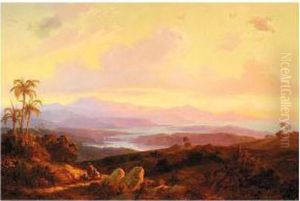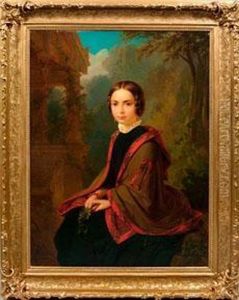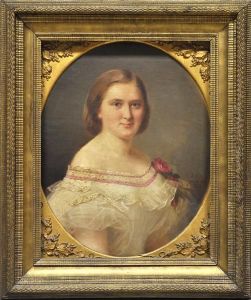Edmund Wodick Paintings
Edmund Wodick was a notable German painter born in 1817, in Magdeburg, within the Kingdom of Prussia. His artistic journey reflects the Romantic movement's influence, which was prevalent during his time, and he is particularly recognized for his contributions to portrait and landscape painting. Wodick's work is characterized by its emotional depth, attention to detail, and the evocative use of light and color, traits that aligned him with the broader Romantic tendencies of his era, emphasizing nature's power and beauty, as well as human emotion and individuality.
After receiving initial artistic instruction in his hometown, Wodick's quest for artistic mastery led him to the Academy of Arts in Düsseldorf, a city that was, at the time, a vibrant center for the arts in Germany. The Düsseldorf Academy was known for fostering a particular style of painting that emphasized meticulous detail, careful composition, and a deep appreciation for landscape as a vehicle for expressing emotional and spiritual themes. It was here that Wodick honed his skills and absorbed the influences that would shape his subsequent career.
Throughout his life, Wodick achieved considerable success as a portraitist, capturing the likenesses of many prominent figures of his time. His portraits are celebrated for their psychological depth and the subtle interplay of light and shadow, which reveal the inner character of his subjects. In addition to his portraits, Wodick's landscapes contribute significantly to his legacy. These works often depict serene, idyllic scenes imbued with a sense of nostalgia and tranquility, reflecting the Romantic fascination with nature as a source of inspiration and contemplation.
Despite his achievements, Edmund Wodick remains a somewhat lesser-known figure in the broader panorama of 19th-century European art, overshadowed perhaps by his more famous contemporaries. Nevertheless, his work offers a compelling insight into the Romantic spirit of his time, distinguished by its technical skill, emotional depth, and the artist's clear love for the natural world and keen observation of human nature. Wodick passed away in 1886, leaving behind a body of work that continues to be appreciated for its contribution to the Romantic movement and its portrayal of the German landscape and character during the 19th century.


